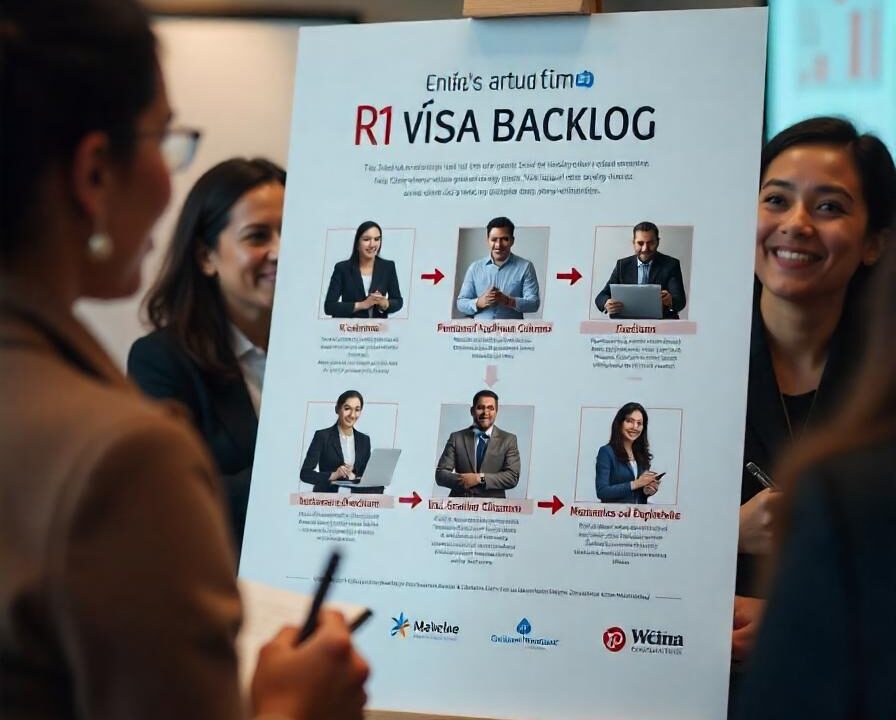The R-1 visa allows foreign nationals to enter the United States temporarily to work in religious capacities. While the R-1 visa category typically does not have annual caps or limits, certain factors can lead to backlogs in processing times. This overview will discuss the circumstances that contribute to R-1 visa backlogs, the implications for applicants, and strategies for navigating these challenges.
Visa Sponsorship & Remote Jobs Free Training.
1. What Causes R-1 Visa Backlogs?
Although the R-1 visa is not subject to an annual quota, backlogs can arise due to several reasons:
- Increased Demand:
A surge in applications for R-1 visas, especially during peak times or following significant religious events, can overwhelm processing capacities. For example, during holiday seasons or major religious observances, organizations may hire more religious workers, leading to an influx of petitions. - USCIS Processing Capacity:
The efficiency of U.S. Citizenship and Immigration Services (USCIS) can affect processing times. Resource constraints, staffing shortages, or changes in processing protocols may lead to delays in adjudicating R-1 visa petitions. - Changes in Policy:
Any updates or changes in immigration policies, procedures, or regulations can impact processing times. When new requirements or guidelines are implemented, it may slow down the processing of existing applications as USCIS adapts to the changes. - Documentary Requirements:
Incomplete or inaccurate documentation submitted with the R-1 visa petition can result in Requests for Evidence (RFEs) from USCIS. This not only delays the processing of the individual application but can also contribute to overall backlog issues.
Happy Face Academy Soft Tech Free Training.
2. Implications of Backlogs for Applicants
R-1 visa backlogs can have several significant implications for applicants:
- Extended Processing Times:
Applicants may experience longer waiting periods before receiving decisions on their petitions. This uncertainty can disrupt their employment plans and affect their ability to serve in their religious roles in the U.S. - Impact on Job Offers:
Delays in processing may lead to complications with job offers. Employers may need to adjust their hiring timelines or seek alternative arrangements if visa approvals are prolonged. - Uncertainty for Families:
If the R-1 visa applicant has dependents (spouse and children) who will accompany them under the R-2 visa, any delays in the primary applicant’s visa approval will also affect their ability to enter the U.S. on time. - Limited Flexibility:
Applicants may face limitations regarding their ability to travel, switch employers, or change their visa status while waiting for their R-1 visa processing to be completed.
Happy Face Academy Premium Subscribers
3. Navigating R-1 Visa Backlogs
To mitigate the impact of potential backlogs, applicants and sponsoring organizations can take several proactive steps:
- File Early:
To avoid delays, applicants should submit their R-1 visa petitions as early as possible, considering processing times and any deadlines related to their religious duties. - Consider Premium Processing:
Premium processing is available for R-1 visa petitions for an additional fee. This option expedites the processing time to 15 calendar days, significantly reducing wait times compared to regular processing. - Ensure Complete Documentation:
Submitting a thoroughly prepared petition with accurate and complete documentation can help prevent RFEs and subsequent delays. - Stay Informed:
Applicants should regularly check the USCIS website and the Department of State’s visa bulletin for updates on processing times, policy changes, and other relevant information. - Seek Legal Guidance:
Consulting with an immigration attorney or specialist can provide valuable insights into the application process and help navigate any complexities related to backlogs.
While the R-1 visa category does not have strict quotas, applicants may still encounter backlogs due to various factors, including increased demand, USCIS processing capacity, and policy changes. Understanding the causes and implications of these backlogs can help applicants and sponsoring organizations navigate the process more effectively and minimize delays in securing R-1 visas for religious workers.








